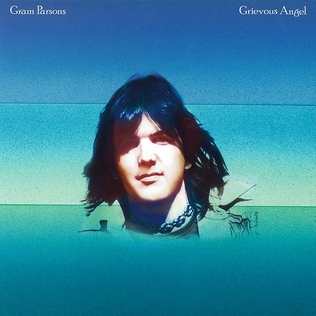Grievous Angel
| Grievous Angel | ||||
|---|---|---|---|---|
 |
||||
| Studio album by Gram Parsons | ||||
| Released | January 1974 | |||
| Recorded | Summer 1973 at Wally Heider Studio 4, Hollywood, California | |||
| Genre | Country rock | |||
| Length | 36:14 | |||
| Label | Reprise | |||
| Producer | Gram Parsons | |||
| Gram Parsons chronology | ||||
|
||||
| Professional ratings | |
|---|---|
| Review scores | |
| Source | Rating |
| Allmusic | |
| Robert Christgau | (A) |
| Rolling Stone | (favorable) |
Grievous Angel is the second solo album by Gram Parsons, compiled from summer 1973 sessions and released four months after his death from a morphine and alcohol overdose in September 1973. It received great critical acclaim upon release, but failed to find commercial success, a fate shared with his previous efforts solo and with The Flying Burrito Brothers. Grievous Angel peaked at number 195 on the Billboard charts. Despite its modest sales, it is viewed as a successful example of the hybrid between country and rock and roll Parsons called "Cosmic American Music".
In 2012, the album was ranked number 425 on Rolling Stone magazine's list of the 500 greatest albums of all time.
After a ramshackle tour in the spring and summer of 1973, Gram Parsons again convened with his singing partner Emmylou Harris, various members of Elvis Presley's "Hot Band", including James Burton and Glen Hardin and the occasional guest (such as Bernie Leadon and Linda Ronstadt) to record his second solo album for Reprise Records. Unlike his previous album GP, Grievous Angel was a planned affair with several arrangements having been worked out on the road.
The sessions for Grievous Angel took place at Wally Heider Studio 4 in Hollywood with Parsons producing. In a 2013 Uncut cover story about Parsons's solo work, acoustic guitarist Herb Peterson recalls to David Cavanagh that when the singer showed up he was a mess: "He came in late. Emmy brought him to the studio. She was kind of minding him. We'd already tracked four or five tunes, and he was not in any kind of shape to record with us. He was generally out of it for the most part." Parsons, who was battling heroin and alcohol addiction, would rally, however, with bassist Emory Gordy recalling in David N. Meyers 2007 Parsons biography Twenty Thousand Roads, "Gram played us each of the songs that he had ready...We took it from there. It was loose as far as formal arranging was concerned - we played what we thought was right for the song, and it all seemed to fall together...He was in good shape, Gram. There was a lot of energy going on in the studio for the whole of that album. Gram was bouncing all over the place and Emmy was bouncing around him. They were great, happy sessions." In the 2004 documentary Fallen Angel, however, manager Phil Kaufman claims Parsons was still drinking like he had been during the recording of GP, "but not as bad. He was hiding what he was doing. In other words, before he was more blatant in his drinking and his drugs."
...
Wikipedia
